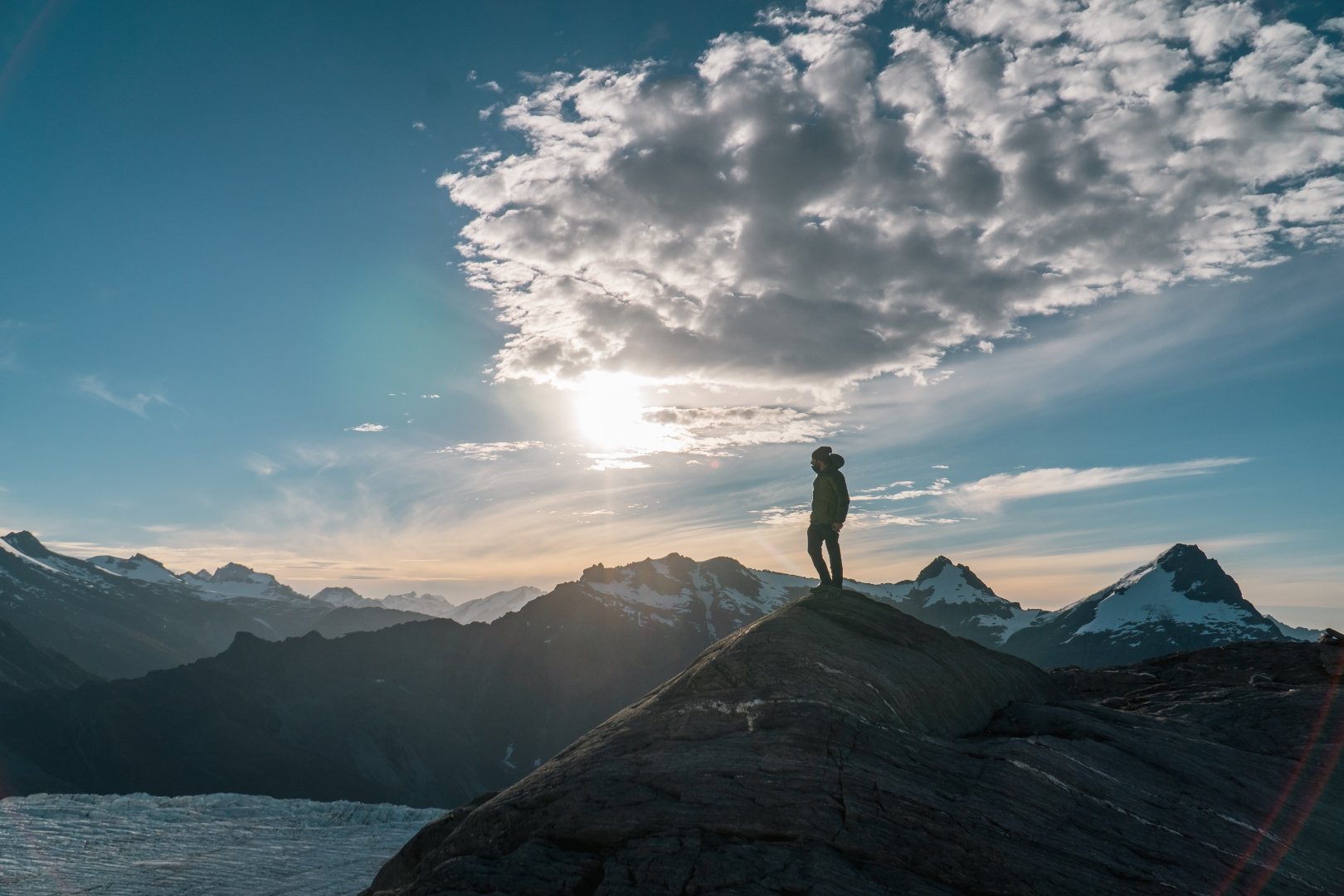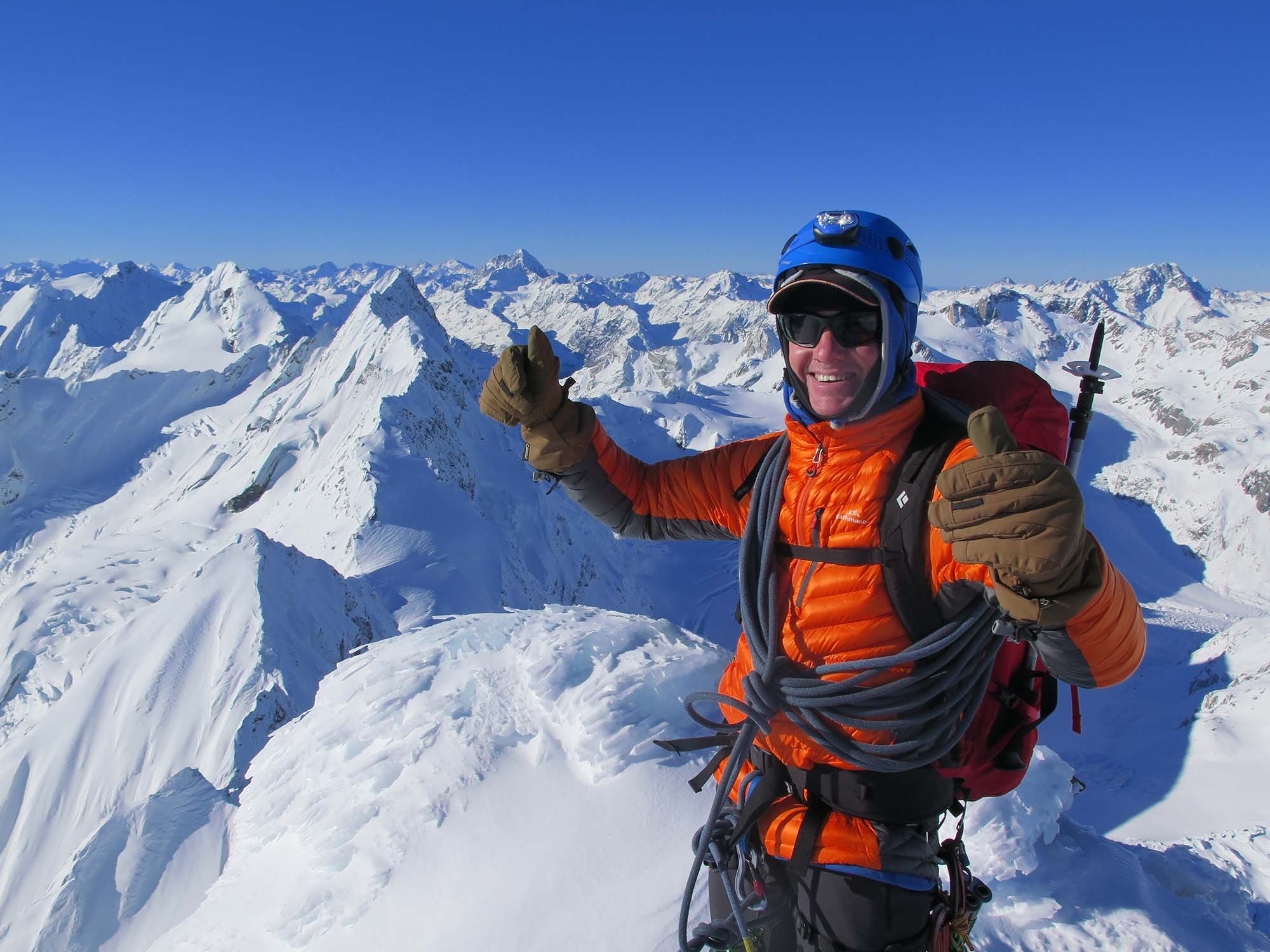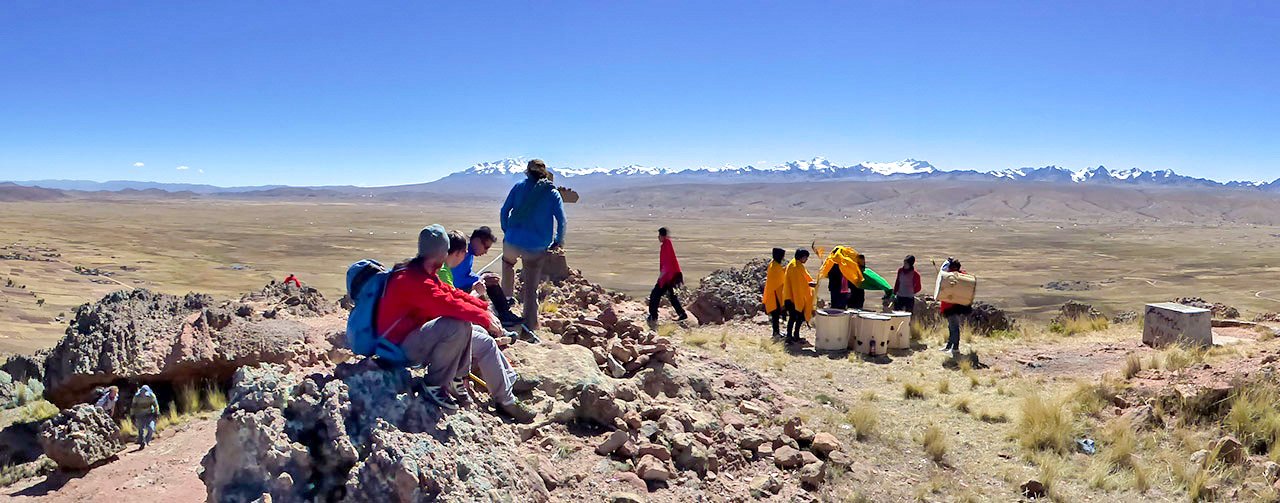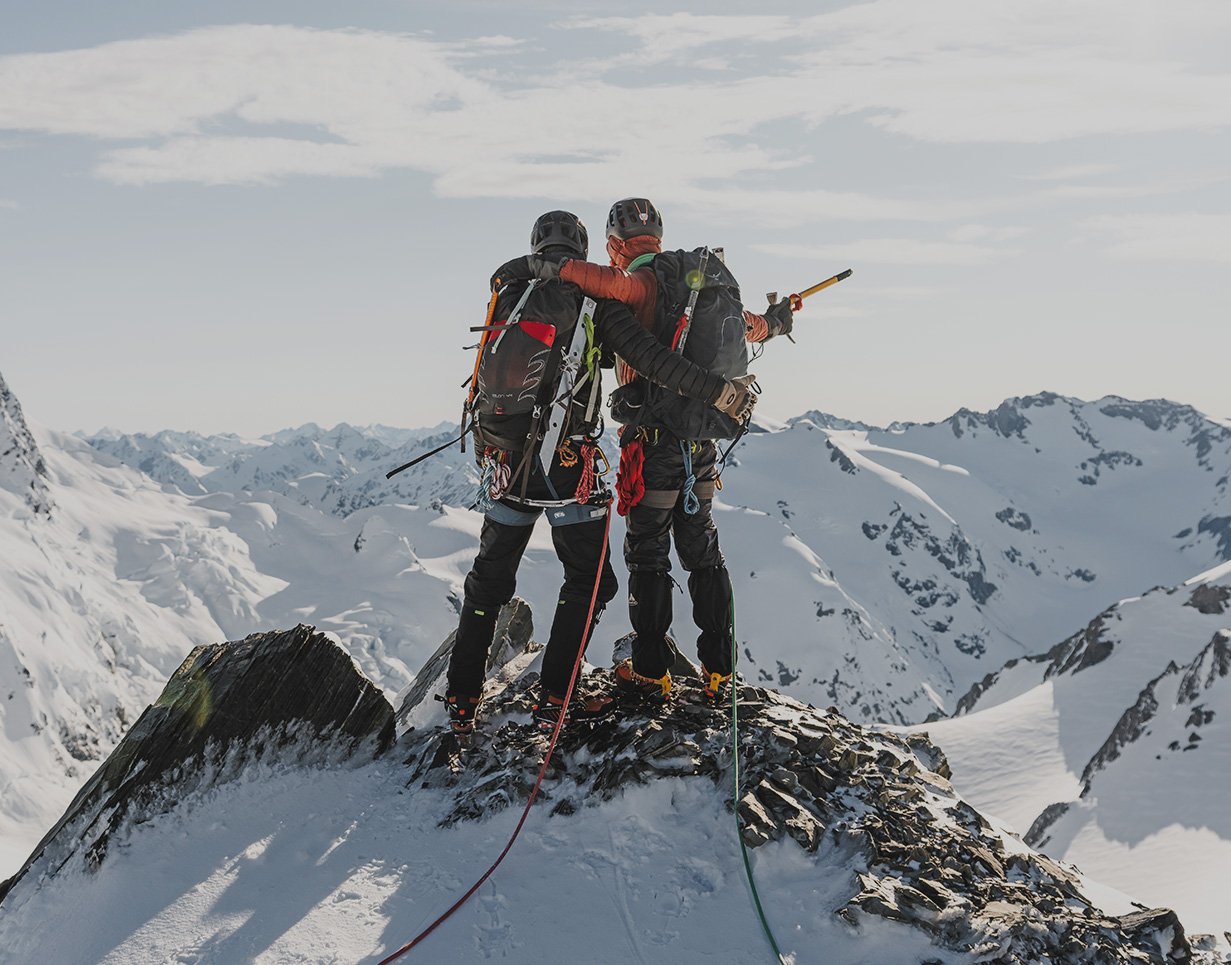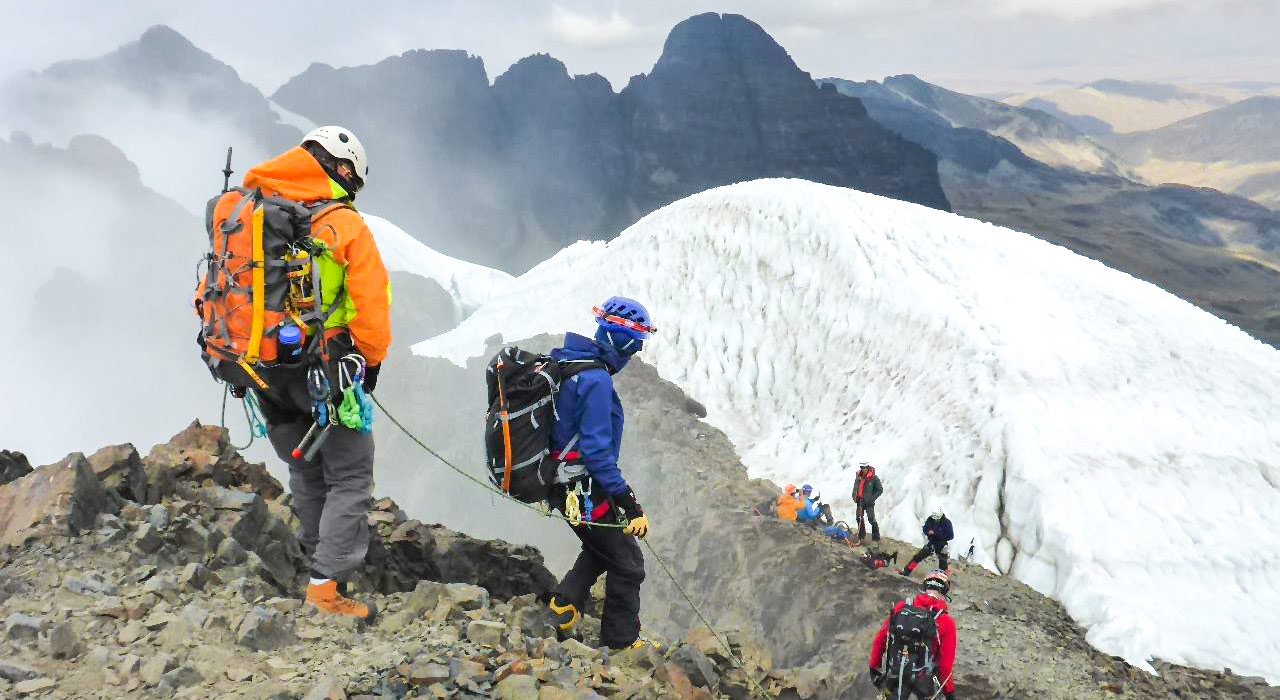
alpinismo boliviano
Discover Bolivia's Cordillera Real with Alpine Guides. Nestled in the heart of the Andes, Bolivia offers a contrasting world of ancient civilization and high-altitude mountaineering challenges.
This intermediate 14-day mountaineering expedition will put your fitness and stamina to the test as you climb 3 peaks up to 6,000m altitude, including Pico Austria (5,350 m), Pequeno Alpamayo (5,410 m) and Huayna Potosi (6,094 m).
This expedition is ideal for people who have participated in one of our Alpine Skills Courses (ASC), Mountain Experience Course (MEC), or equivalent.
Trip description
Departure: ex-La Paz, Bolivia
La Paz, Bolivia’s capital city, is one of the most important cultural cities in Latin America, as it hosts several landmarks belonging to colonial times. The climate has a mix of subtropical highland and sub-polar oceanic characteristics. https://en.wikipedia.org/wiki/La_Paz
Lake Titicaca and Condoriri
Our expedition begins and ends in the beautiful capital city of La Paz in Bolivia, at 3,640 m above sea level.
The trip is divided into two parts. The first involves trekking in some of the local gems around La Paz and the famous Lake Titicaca, allowing guests to slowly acclimatize to the high altitude (roughly 4,000 m).
The second part of the expedition will take you to the beautiful valleys of Condoriri National Park, in the Cordillera Real. The focus is to summit 3 peaks between 5,000 and 6,000 metres, involving an introductory to intermediate level of mountaineering.
Light-weight Backpacking
The beauty of an assisted expedition is that you do not carry a huge backpack. Throughout the expedition, we are assisted by porters and mules. Your heavy gear bag will be “magically” transported to be waiting at the next destination.
You will normally carry up to 10 kg weight on trekking days, and up to 15 kg on mountaineering days.
Schedule and Specifics
Price: $6,250 US per person
What’s included:
Guides fees and expedition organisation
Airport transfers Airport - La Paz –Airport.
All land transport ex-La Paz
3 nights accommodation in La Paz (1st and 2nd nights, and last night)
All meals and non-alcoholic beverages
Group expedition equipment including: medical kit, oxygen, tents, stoves, and cooking gear
What’s not included:
Airfares to La Paz and required Visa/passport fees, plus excess gear over airline limits
Insurance for travel, medical, and evacuation
Any costs incurred for early evacuation or abandonment of the expedition
Personal clothing and gear
Any accommodation and meals outside of trip dates
Accommodation in La Paz before the start, and after the end of the expedition
Personal expenses and tips to guides and locals
2025 Dates
Start: Friday, May 30th, 2025
Last Day: Thursday, June 12th, 2025
Minimum Bookings
Our maximum guide-to-guest ratio is 1 to 4.
Minimum Bookings: A minimum of 4 participants is required to run a trip. Please contact us to check what the current bookings are. If minimum requirements aren’t available, you will receive a full refund. The cut-off for bookings is 90 days before departure.
Alpine Guides and Bolivia Expe
The trip will be led by our bilingual IFMGA Expedition Leader: Pablo Borjas. Pablo has guided multiple expeditions in Bolivia over the years and completed his IFMGA guide’s training there. If group numbers allow, there will be additional AGL guides.
Bolivia Expe provides support through ground transport and logistics, mules, porters, base camp services, and VHF radio support.
Bolivia Expe offers high-level services in the field of " Sustainable " Adventure Tourism in Bolivia and beyond its borders. Founded by Sergio Gomez, they have led many international groups through their beautiful country.
cost and booking requirements
Price: US$6,250
All prices are quoted and paid for in US Dollars, per person.
We need a completed expedition application form and a non-refundable deposit of US$500 to confirm your place.
Balance of payment is required by 60 days before the start of the trip. Please make your payment into our US$ bank account and take note of our booking conditions for South American expeditions.
Bank account for payments :
Account Name: Alpine Guides (Aoraki) Ltd
Bank of New Zealand
Account: 836155-0000
Swift Code: BKNZNZ22
Use your family name as a reference for payments.
expedition details
-
Day 1 - Fly to La Paz and transfer to your hotel.
Day 2 - Panoramic city tour. Second hotel night and welcome dinner.
Day 3 - Transfer from La Paz to Lake Titicaca (alt 3.800m). Day hiking and overnight in Copacabana.
Day 4 - Trek to Yampupata and visit of Isla del Sol. Second overnight in Copacabana.
Day 5 - Transfer to Condoriri Valley to the Intermediate Camp (alt 4,450m). Overnight in tents.
Day 6 - Trek to Condoriri Base Camp (alt 4,650m). Mountaineering review. Overnight in tents.
Day 7 - Ascent of Pico Austria (alt 5,350 m) or other nearby peak. Overnight in tents.
Day 8 - Training and climbing (glacier school). Overnight in tents.
Day 9 - Rest day. Overnight in tents.
Day 10 - Ascent of Pequeno Alpamayo (alt 5,410 m) or other nearby peak. Overnight in tents.
Day 11 - Transfer to Huayna Potosi Base Camp. Overnight in hut.
Day 12 - Climb to Huayna Potosi High Camp. Overnight in hut
Day 13 - Summit of Huayna Potosi (alt 6,094 m). Return to base camp and transfer to La Paz. Overnight in hotel.
Day 14 - End of trip and fly out of La Paz.
-
Passport – make sure it is valid and (if applicable) suitable visas for Bolivia and any other countries you are planning to visit. An entry visa is usually not required if staying less than 1 month.
You must have at least 6 months left before the expiration of your passport as many countries will not let you in with less.
Departure Tax: Please note there is a USD $25 departure tax when leaving Bolivia. This is sometimes included in the airfare. Please check with your airline before departure.
Bolivia entry/exit requirements: Your passport must contain a Bolivia entry stamp, without this you’ll have to pay a fine when you leave the country. If you enter Bolivia overland ensure that your passport is stamped on both sides of the border, with an exit stamp from the country you are leaving and an entry stamp on the Bolivian side.
UK passport holders do not need a visa for stays of up to 90 days and CAN, AUS, and NZ passport holders do not need a visa for stays of up to 30 days.
-
The standard air route to La Paz is via Santiago, Chile. It is cheaper to book well in advance, but we strongly advise ensuring that the return section of your air travel is “flexible” - able to be changed with a small or no fee - to help work around with unforeseen exit circumstances – either earlier, or later than planned.
We recommend travel agents to do trip planning. There is a small surcharge, but over the years we have watched friends and guests who organised all their travel go through a lot of grief and expense rearranging travel, while we can make a single phone call or email to rebook.
On more than one occasion our agents have contacted us before complications arising.
-
Check with your doctor about relevant immunisations for travel, especially if you are visiting more than one location on your trip. The most common vaccinations for Bolivia are typhoid and Hepatitis A.
Anyone with any medical conditions should ensure they have the appropriate medication and that it has not expired (for instance those people who use “twice a year” Ventolin for asthma).
We recommend a full medical examination by your GP and will provide you with a questionnaire. It will be useful for insurance purposes.
-
Be prepared, particularly if you are from NZ or Australia, to return via the red line at customs with “something to declare”.
Before returning you should do a thorough clean and check, before packing. Then write a list of all the suspect items you have: boots, tents, crampons, stoves wood or fiber souvenirs, medical items, etc.
State what you have, and how you have cleaned/stored them. When you go through the red line on arrival, hand them the list. Most frequently they appreciate that and ask to see one item, then wave you through – usually you end up being processed much faster than the long line in the green lane.
-
The food on offer at the base camps is plentiful and fresh. As with most dining in Bolivia, it will tend to be in the Central European style - big on the carnivorous element. The dining tents are large and comfortable with tables and chairs, plenty of snacks, and brews.
If you are vegetarian or have particular diet requirements you must let us know about this before the expedition starts. On the expedition, we will be cooking in small groups. Mostly, this will be lighter carbs/protein and veggies of a longer-lasting variety.
-
The Andes of Bolivia has a dry and sunny winter season which lasts from April to October. At the campsites near glaciated mountains at an average of 4,600m, the daytime temperature ranges from 12ºC to 18ºC, whilst the nighttime temperature ranges from ‑5ºC to ‑15ºC. The weather tends to be dry, clear, and stable providing ideal trekking and climbing conditions.
The snow conditions also tend to be stable, being firmly packed, making for ease of travel and navigation. La Paz and Lake Titicaca also follow similar weather patterns, with warmer clear days, little wind, and cold nights.
-
A few phrases in Spanish are always well-appreciated by the locals. The support crew we use generally speak some English, but outside of the big cities, most people do not.
It’s always good to know how to ask where the toilets are, or how to get a drink or food. Spanish podcast lessons are great ways to pass the time at camp.
-
Bolivia uses the Bolivianos as currency. There are Casa de Cambio (exchanges) in La Paz. It is useful to bring some $US in cash (other currency less frequently accepted). Our staff will get local advice when we arrive.
You can also check with your local bank and see if you can pre-order some Bolivianos before the trip so that you have some of the local currency upon arrival.
-
Although there is no prerequisite tipping culture, like the US for example, it is appreciated by the locals to receive a token of gratitude for their efforts. Certainly, the porters are used to it.
-
You must organise your own travel insurance and insurance for emergency purposes.
Your Park entry permit will cover any required helicopter evacuation from the mountain. This is only the case when specifically authorized by the on-the-mountain doctor at Plaza Argentina or Plaza de Mulas.
Insurance is available through:
Ripcord Rescue Travel Insurance
NZ Alpine Club (NZ residents only)
Most standard travel insurance excludes expedition-related claims, but is essential for your basic travel needs.
Bring evidence of your physical examination from your own GP.
Your AGL guide(s) have VHF radio support and also carry a satellite phone for emergencies.
-
Although Aconcagua is not a super-technical mountain, it is a very strenuous endeavour, and not to be underestimated. Altitude can and does affect everyone differently.
While we will be trying to give each other the best chance for optimal acclimation, everyone will need to pay attention to what their own body is telling them - and let the guide know!
We have the ability to help with your successful ascent and acclimation, but only if we know what is going on.
Essential to a successful ascent is putting in some time to train prior to turning up. The best training you can do are long days carrying moderate to heavy packs. On at least 3- 4 of the days you will need to carry up to 20kg.
We use pulse oximeters right through the expedition. These are small medical instruments that measure the oxygen saturation level of your blood - an indication of how you are acclimatising.
-
We will be staying in a mix of hotels ( in the cities), small alpine tents (2-3 people per tent) and mountain huts. We also have large mess tents where we will take our meals.
We have costed in the assistance of a local porters, cooks and mules. This allows you to hike/climb with light weights on your back so that you can focus on acclimatising and having a successful trip.
-
Please bring all the gear listed. There is no facility to rent from Alpine Guides in NZ.
You can rent equipment in La Paz at “Andean Basecamp”. However, equipment needs to be reserved ahead of time. After the exchange rate the prices are similar to NZ/AU.
-
Thirty days before the beginning of the expedition we will send general information such as hotel bookings, contact details, and other logistical data.
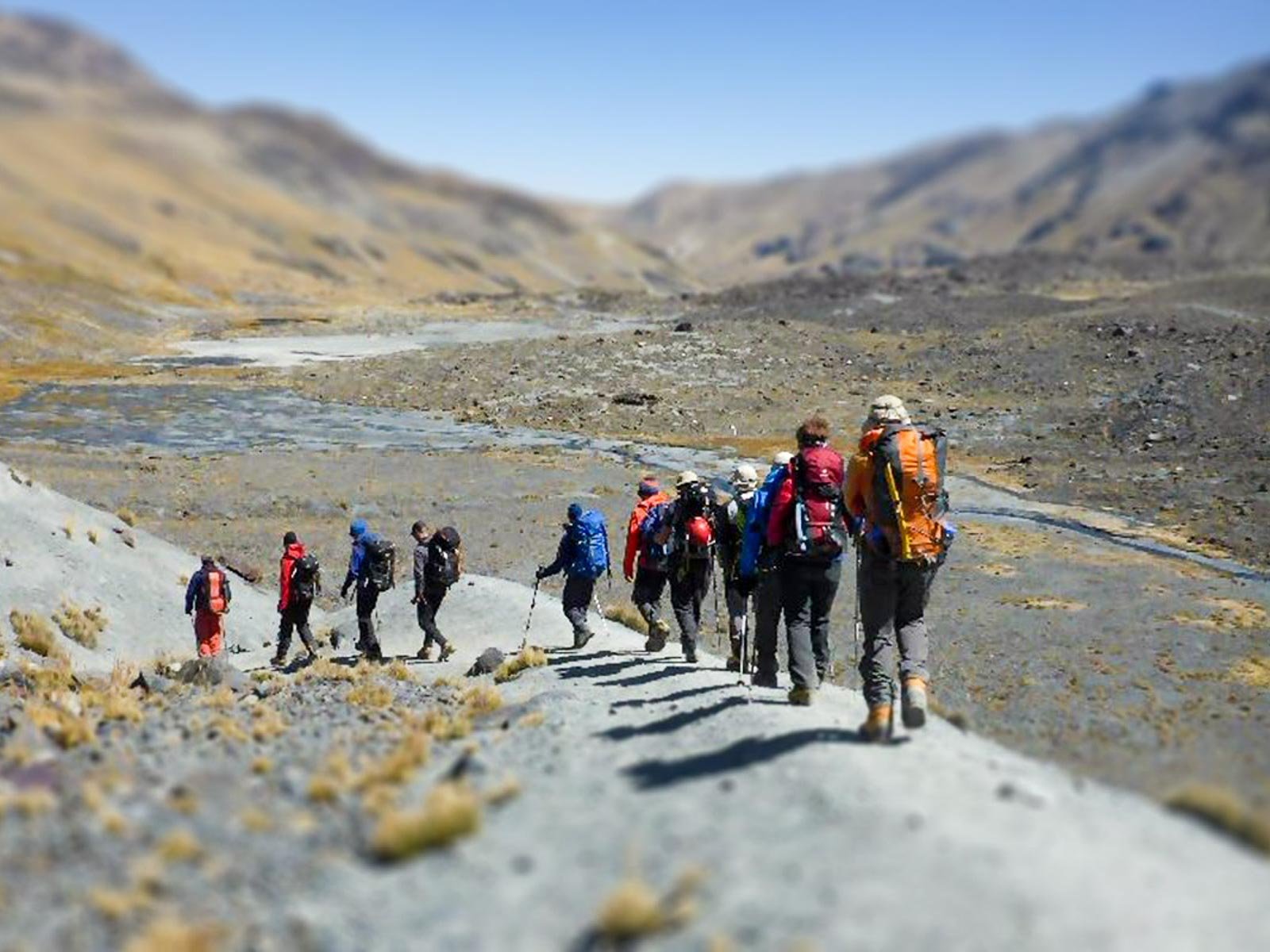
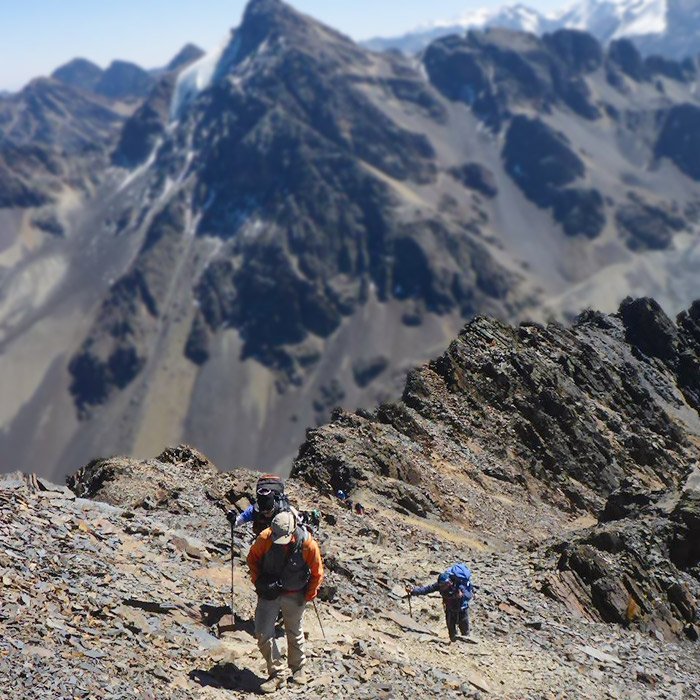
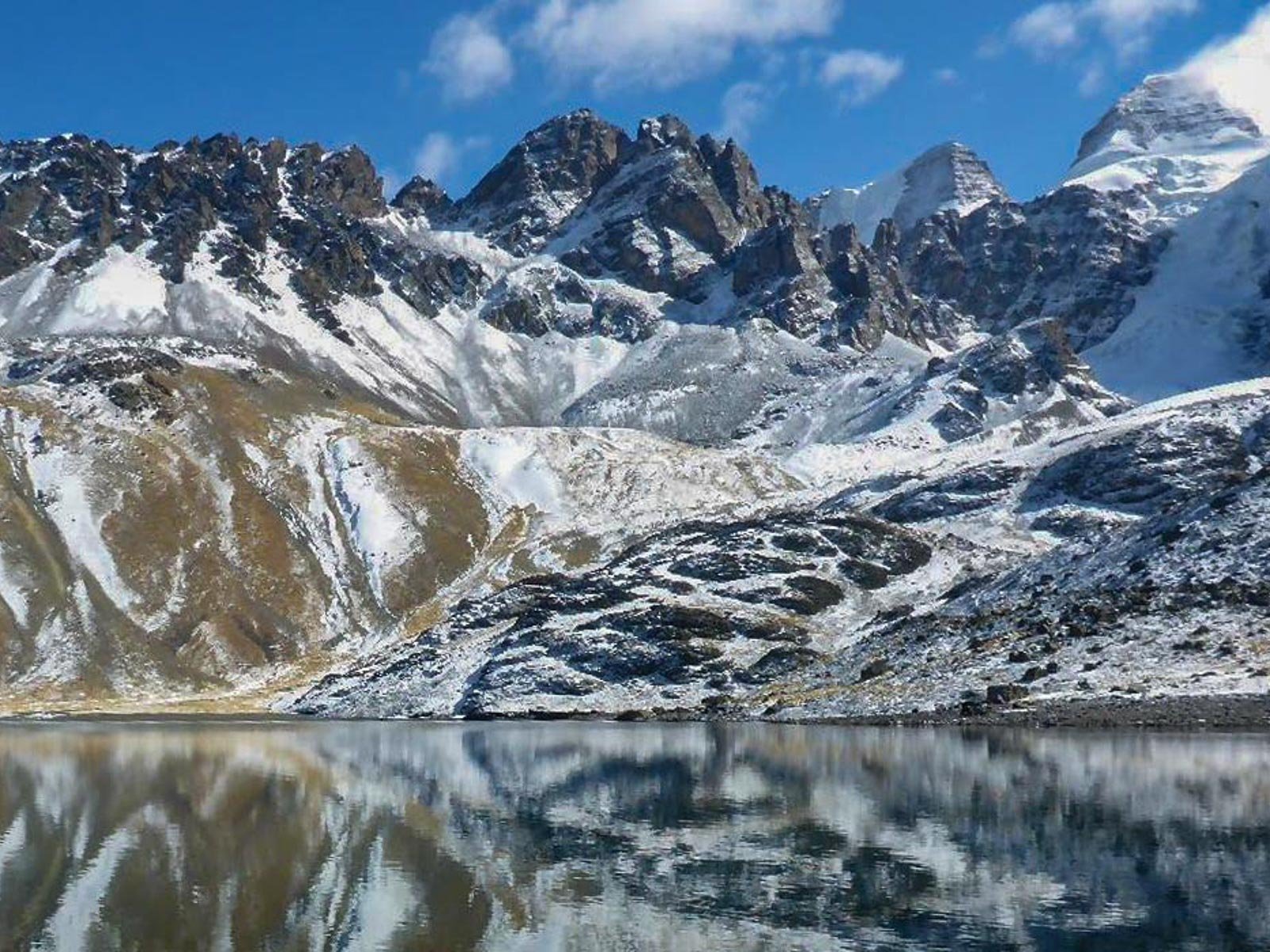



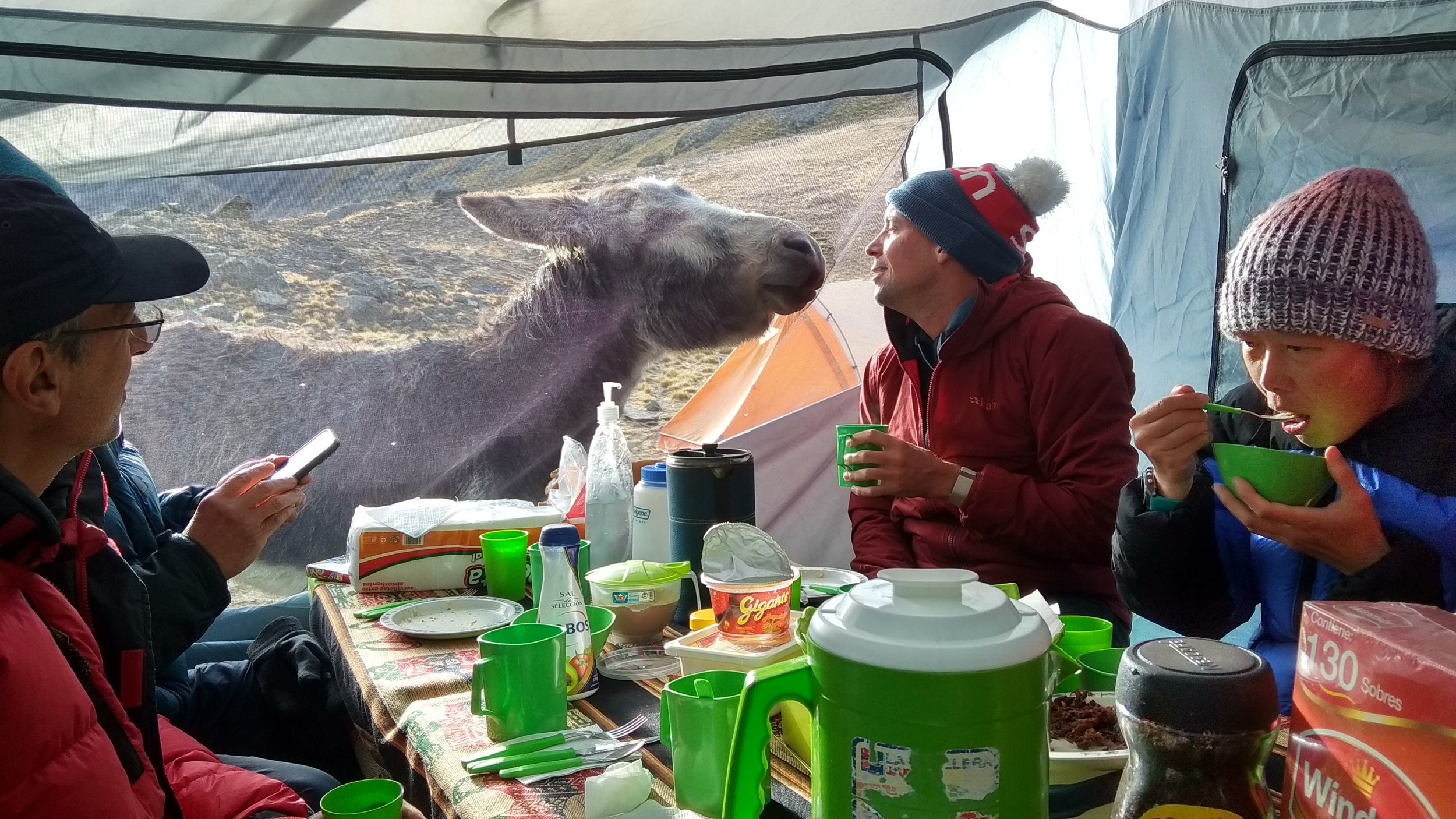
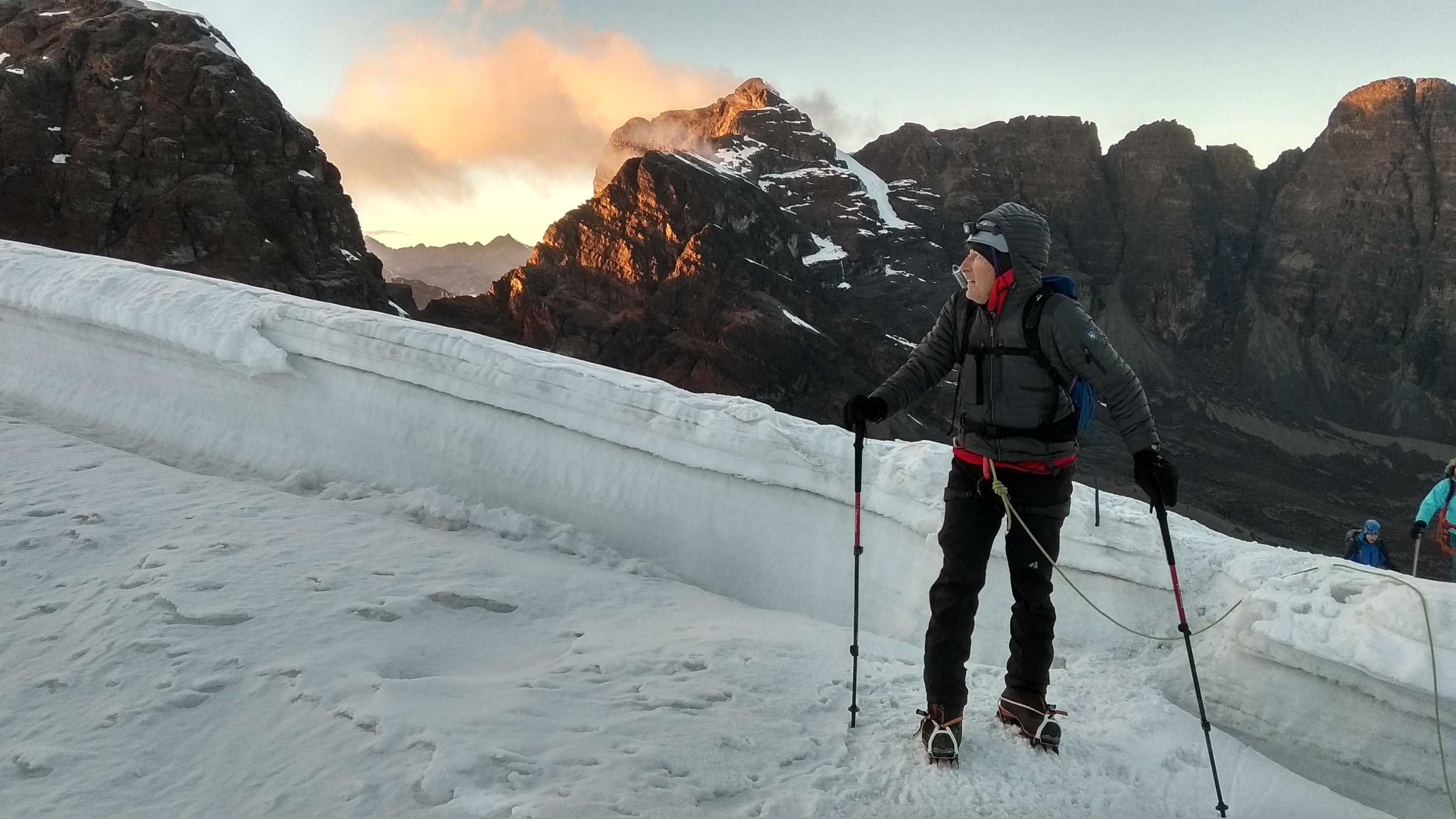

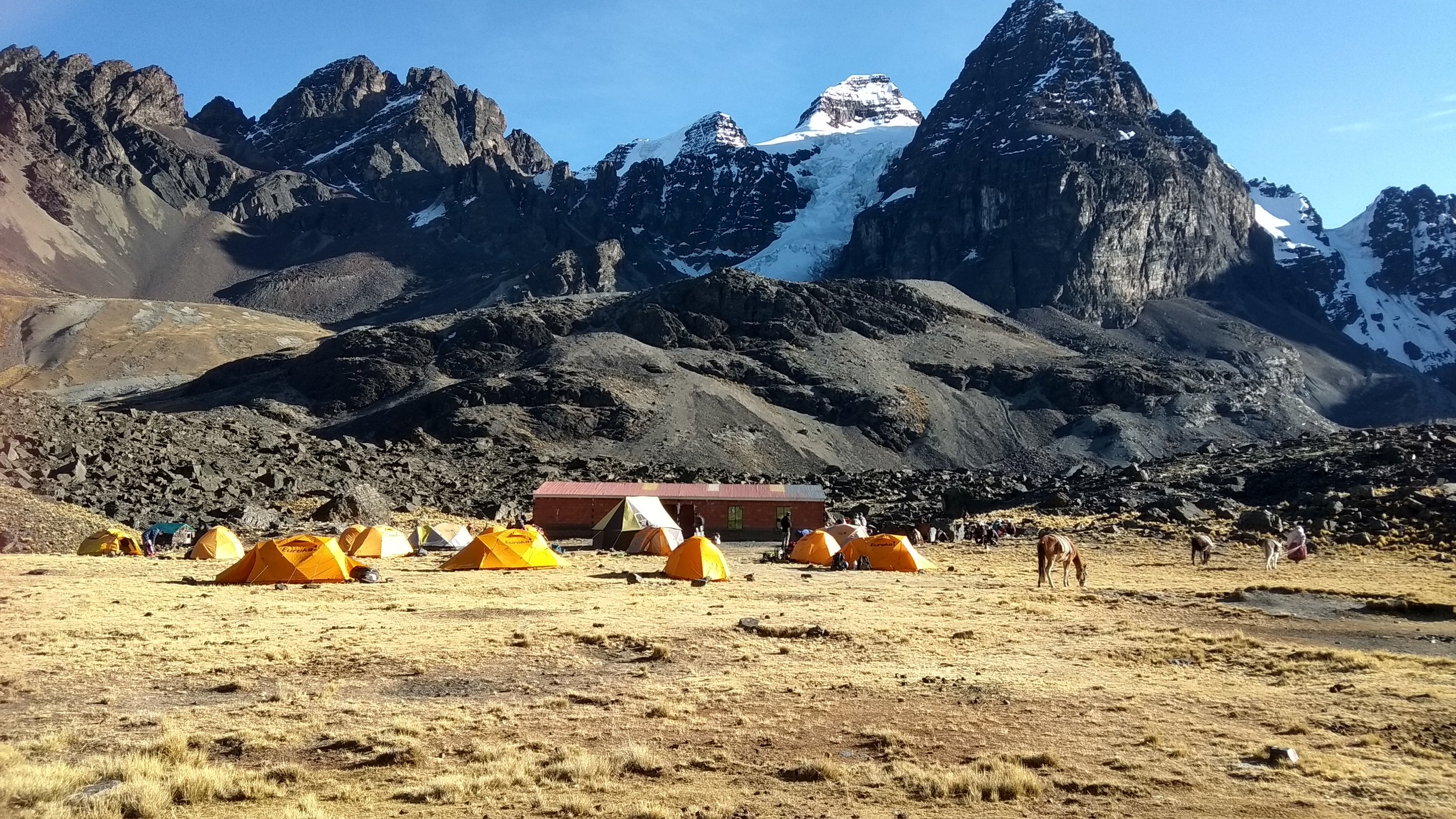
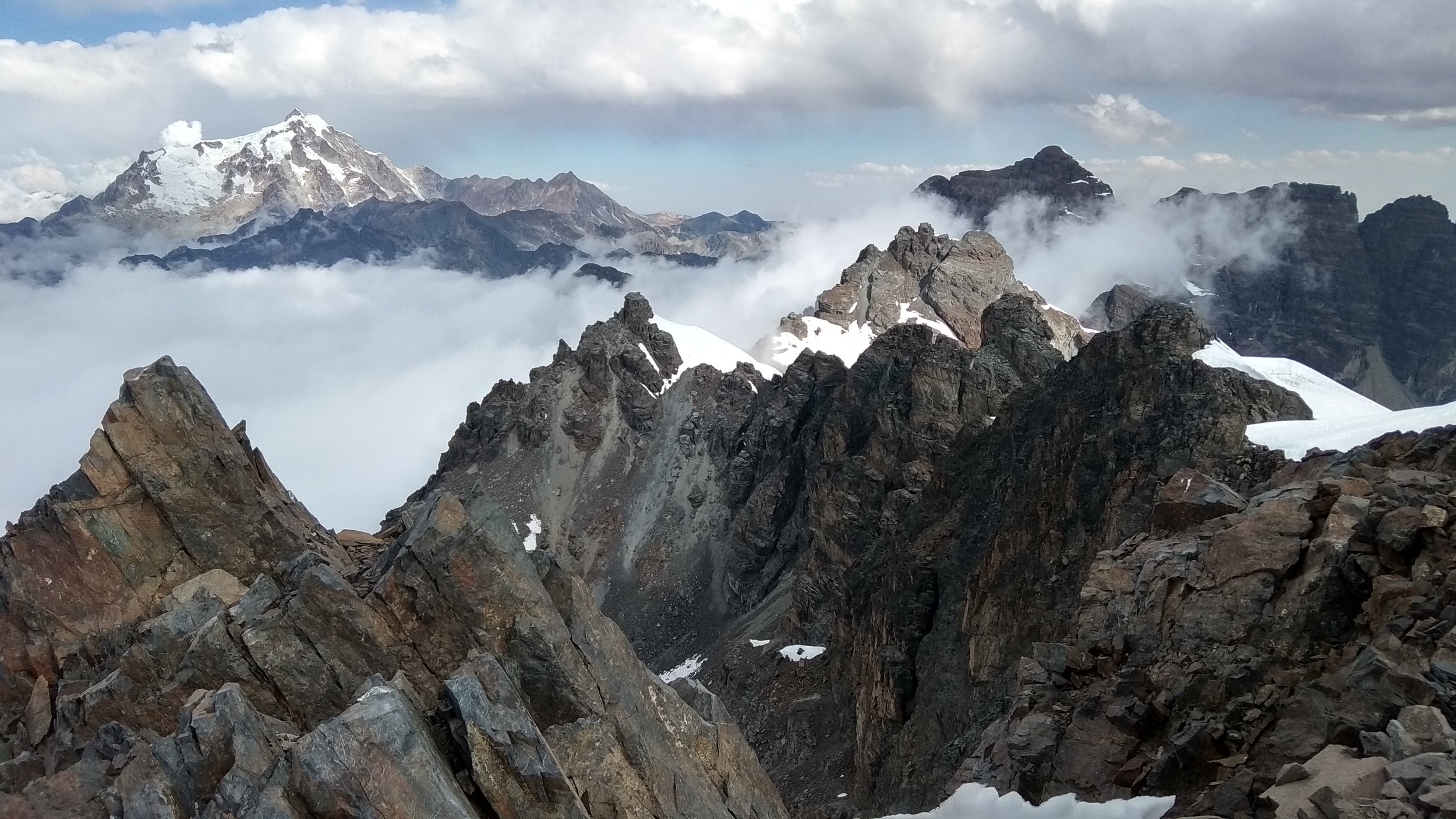
More trip ideas
Ascents Program
Pre-Inca Apacheta Trail
Aconcagua Expedition
